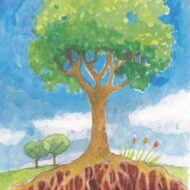Some educational and parenting resources for you:
A MUST see, hysterical and insightful TEDtalk with Sir Ken Robinson
Sir Ken Robinson is author of Out of Our Minds: Learning to be Creative, and a leading expert on innovation and human resources. In this talk, he makes an entertaining (and profoundly moving) case for creating an education system that nurtures creativity, rather than undermining it. (Recorded February, 2006 in Monterey, CA.)
Thank you Christoph for directing me to this talk.
An interesting NY Times article, So the Torah is a Parenting Guide?
“Indulged, coddled, pressured and micromanaged on the outside, my young patients appeared to be inadvertently deprived of the opportunity to develop an inside,” she writes in her book. “They lack the secure, reliable, welcoming internal structure that we call the ‘self.”’ …
There is a Hasidic saying that Mogel quotes, “If your child has a talent to be a baker, don’t ask him to be a doctor.” By definition, most children cannot be at the top of the class; value their talents in whatever realm you find them. “When we ignore a child’s intrinsic strengths in an effort to push him toward our notion of extraordinary achievement, we are undermining God’s plan,” Mogel writes.
Which leads me to aPsychology Today article on the Sudbury Valley school:
At Sudbury Valley School, there’s no other way to learn. The 38-year-old day facility in Framingham, Massachusetts, is founded on what comes down to a belief about human nature—that children have an innate curiosity to learn and a drive to become effective, independent human beings, no matter how many times they try and fail. And it’s the job of adults to expose them to models and information, answer questions—then get out of the way without trampling motivation. …
Play—it’s by definition absorbing. The outcome is always uncertain. Play makes children nimble—neurobiologically, mentally, behaviorally—capable of adapting to a rapidly evolving world. That makes it just about the best preparation for life in the 21st century. Psychologists believe that play cajoles people toward their human potential because it preserves all the possibilities nervous systems tend to otherwise prune away. It’s no accident that all of the predicaments of play—the challenges, the dares, the races and chases—model the struggle for survival. Think of play as the future with sneakers on.
